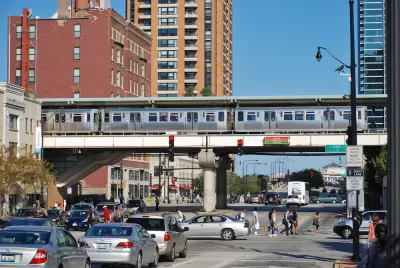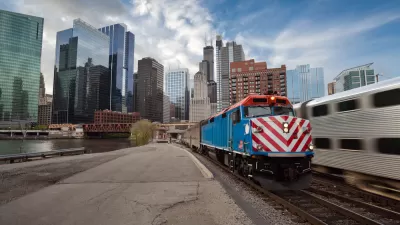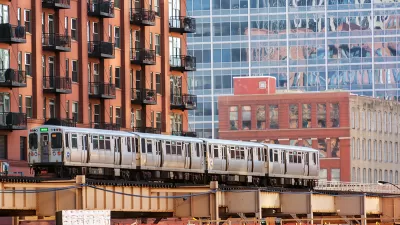The first-of-it’s kind study found that without public transit, Chicago would lose an estimated $35 billion in economic activity annually and the quality of life of residents, particularly women and low-income groups, would take a major hit.

An article from Eureka Alert outlines a new study by the U.S. Department of Energy’s Argonne National Laboratory and MIT that looks at the role the public transit system plays in Chicago — and what would happen if it were eliminated. “The research, presented at a Chicago Transit Authority board meeting in May, identifies major consequences, including increased vehicle congestion, reduced economic activity and a disproportionate impact on underserved communities and minorities,” the article reads.
Researchers say the study is the first they know of to quantify transit value across multiple metrics, which they achieved by modeling a day in Chicago without public transit using Argonne’s POLARIS transportation simulation tool. In addition, “The study assumed that households who did not currently own a car as well as those who owned only one would need to purchase additional vehicles, leading to a 30% increase in vehicle car ownership and causing an economic burden on those households.” They found travel times would increase from around 25 to 34 minutes and speeds would decrease by 14 percent in both urban and suburban areas. Results also revealed reduced access to opportunities would lead people — in particular women and low-income groups — to simply cancel activities, around two million activities daily, which would result in an estimated $35 billion annual loss in economic activity. Overall, the study found that for every $1 invested in transit, $13 in economic activity is created, in addition to travel time savings, increased access to opportunities, and lower vehicle emissions and the resulting health benefits.
The analysis comes as CTA, like many major transit networks across the city after the pandemic, faces major budgetary and operational challenges. Local news outlet WGN9 recently reported ridership has only recovered by 60 percent compared to prepandemic levels, driven by severe service cuts, reliability issues, and staffing shortages. With the expiration of federal COVD relief, the region’s transportation agencies — CTA, Pace, and Metra — face a projected 2026 budget gap of $730 million if additional revenue streams are not secured.
FULL STORY: Argonne-led study highlights public transit’s critical role across Chicago

Maui's Vacation Rental Debate Turns Ugly
Verbal attacks, misinformation campaigns and fistfights plague a high-stakes debate to convert thousands of vacation rentals into long-term housing.

Planetizen Federal Action Tracker
A weekly monitor of how Trump’s orders and actions are impacting planners and planning in America.

In Urban Planning, AI Prompting Could be the New Design Thinking
Creativity has long been key to great urban design. What if we see AI as our new creative partner?

King County Supportive Housing Program Offers Hope for Unhoused Residents
The county is taking a ‘Housing First’ approach that prioritizes getting people into housing, then offering wraparound supportive services.

Researchers Use AI to Get Clearer Picture of US Housing
Analysts are using artificial intelligence to supercharge their research by allowing them to comb through data faster. Though these AI tools can be error prone, they save time and housing researchers are optimistic about the future.

Making Shared Micromobility More Inclusive
Cities and shared mobility system operators can do more to include people with disabilities in planning and operations, per a new report.
Urban Design for Planners 1: Software Tools
This six-course series explores essential urban design concepts using open source software and equips planners with the tools they need to participate fully in the urban design process.
Planning for Universal Design
Learn the tools for implementing Universal Design in planning regulations.
planning NEXT
Appalachian Highlands Housing Partners
Mpact (founded as Rail~Volution)
City of Camden Redevelopment Agency
City of Astoria
City of Portland
City of Laramie




























